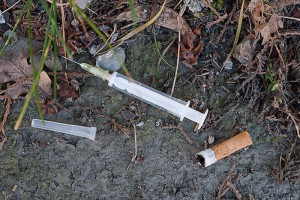Bucket Load of Syringes
MORE than 30 syringes were recently collected from the garden of the Woolworth’s car park in Scone, which is used as a thoroughfare for the Belmore Hotel and several needles were found at the front door of the store following the Scone Cup racing carnival.
“It would be good to get this off the streets,” said Andrew Finch from Woolworth’s, Scone.
“We have a contractor come through and clean it, but it only takes one child to run through the garden,” he said.
“If they are going to do it, do it at home,” Mr Finch said.
Local ambulance said the main drugs they see used intravenously include fentanyl, amphetamines and prescription opiates.
Kristy Kalamchi, clinical nurse specialist in infection prevention at St Vincent’s Health Network said the risk of infection from a needle stick injury in the car park would be extremely low.
“In fact there has never been a case of HIV being contracted from a needle stick injury in the community in Australia,” said Ms Kalamchi.
“Also the needles they use with drug use are very fine and less likely to cause infection say compared to the larger needles we use in hospitals to draw blood and the HIV virus dies within seconds of being out of the body with a change in temperature and exposure to the air,” she said.
There are other blood borne diseases such as hepatitis B and hepatitis C which may be contracted but Ms Kalamchi further explained these risks were also very low,” she said.
“In fact when people to present to us with a needle stick injury, even just as finding one in the garden, we generally don’t begin treatment with a prophylactic,” Kristy Kalamchi said.
However, if people do have a needle stick injury they should present to the emergency department of their nearest hospital for further investigation.
Associate Professor Nadine Ezard, director of drug and alcohol services at St Vincent’s Hospital said easy access to syringe disposal bins were the simplest best way to clean up a needle problem and did not correlate to increased drug use.
“The issue is more around public amenity, I think people are more afraid of seeing needle syringes around and bins are a great idea,” said Associate Professor Ezard.
“The fit packs that are in vending machines come with a disposal box so that people can pop them in there and then pop them in the bin and it doesn’t put people at risk, such as the garbage collectors, so those kinds of things are really good for public health interventions,” she said.
“We don’t see anywhere an association between disposal bins and increasing use, that hasn’t been demonstrated,” she said.
“Many pubs and many public toilets actually do have disposal units inside the toilets which obviously is quite a good public health intervention, not just for people who are injecting active drugs, but also for diabetics,” Nadine Ezard said.
Local ambulance advise needles can be disposed of at the local hospital and can be dropped off at the ambulance station if staff are available.
 scone.com.au
scone.com.au